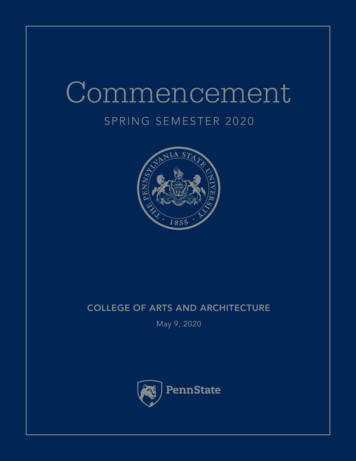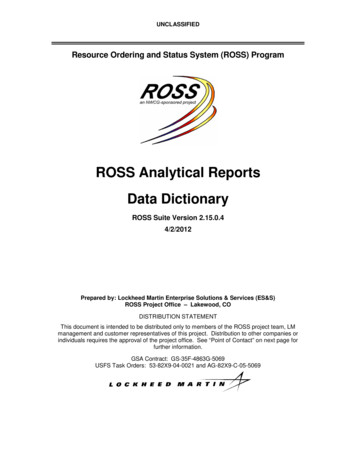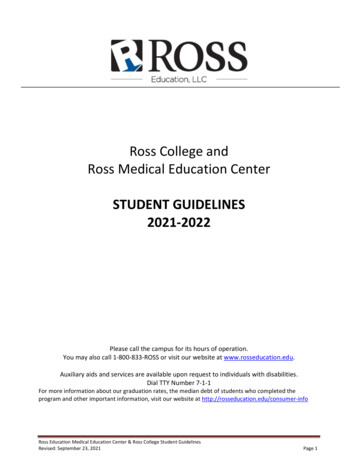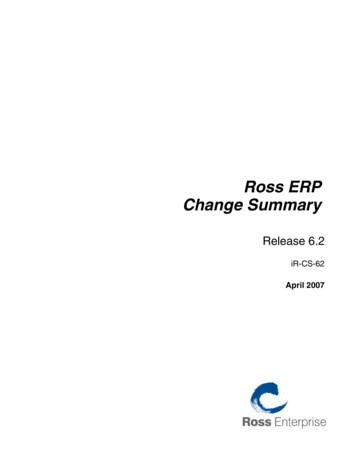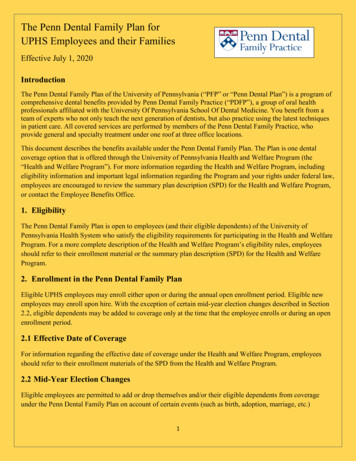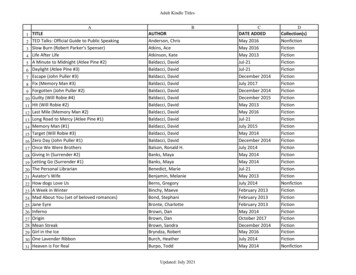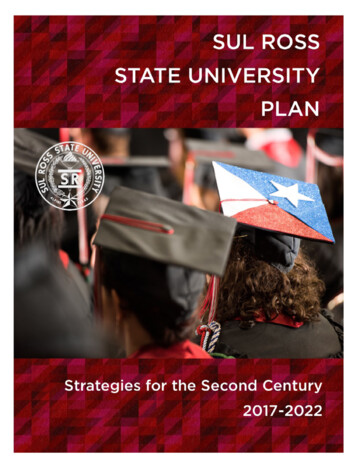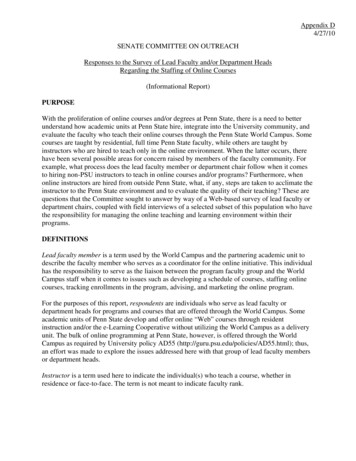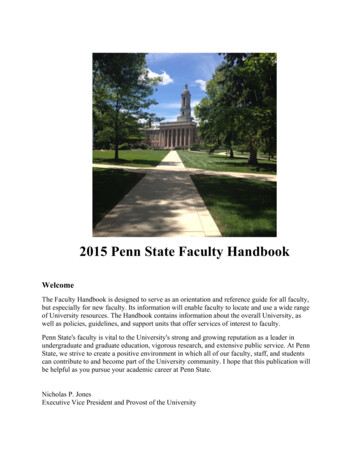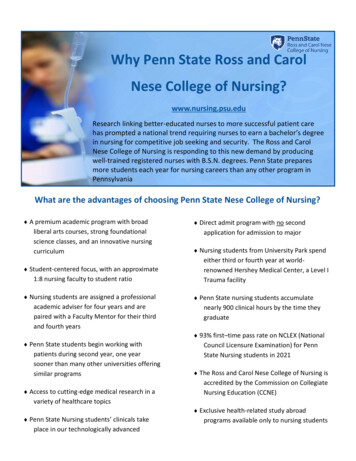
Transcription
Why Penn State Ross and CarolNese College of Nursing?www.nursing.psu.eduResearch linking better-educated nurses to more successful patient carehas prompted a national trend requiring nurses to earn a bachelor’s degreein nursing for competitive job seeking and security. The Ross and CarolNese College of Nursing is responding to this new demand by producingwell-trained registered nurses with B.S.N. degrees. Penn State preparesmore students each year for nursing careers than any other program inPennsylvaniaWhat are the advantages of choosing Penn State Nese College of Nursing? A premium academic program with broadliberal arts courses, strong foundationalscience classes, and an innovative nursingcurriculum Student-centered focus, with an approximate1:8 nursing faculty to student ratio Nursing students are assigned a professionalacademic adviser for four years and arepaired with a Faculty Mentor for their thirdand fourth years Penn State students begin working withpatients during second year, one yearsooner than many other universities offeringsimilar programs Access to cutting-edge medical research in avariety of healthcare topics Penn State Nursing students’ clinicals takeplace in our technologically advanced Direct admit program with no secondapplication for admission to major Nursing students from University Park spendeither third or fourth year at worldrenowned Hershey Medical Center, a Level ITrauma facility Penn State nursing students accumulatenearly 900 clinical hours by the time theygraduate 93% first–time pass rate on NCLEX (NationalCouncil Licensure Examination) for PennState Nursing students in 2021 The Ross and Carol Nese College of Nursing isaccredited by the Commission on CollegiateNursing Education (CCNE) Exclusive health-related study abroadprograms available only to nursing students
How can you prepare for nursing now?While in high school, there are many things you can do to help learn if nursing is right for you. Maintain a high GPA Develop solid organizational, test-takingand study skills Take algebra, geometry, and other higher-level mathematics courses Complete social science courses, likepsychology or sociology Obtain certification in first-aid and CPR Volunteer or shadow a medical professional at ahospital, nursing home, clinic or doctor’s office Talk to family members or friends who arenurses, or interview nurses in your community Join HOSA—Future Health Professionals, or asimilar organization, if offered at your school Select anatomy, physiology and chemistryclassesWhat opportunities are there in nursing careers?Here is a list of just a few career paths available to graduates of Penn State Nese College of Nursing: Critical Care - work with the critically ill orinjured in the intensive care unit Neonatal - provide complete care fornewborns: weighing, feeding andmonitoring health Travel - take on short-term assignments totemporarily fill a staff opening; can beanywhere in the U.S. Oncology - care for cancer patients Emergency Room - work in a fast-pacedenvironment with critical, life-threateningcases Doctor’s Office - work one-on-one with patients,taking vital signs, collecting information, doingblood work and giving injections Cruise Ship - provide day-to-day health care topassengers and crew members Psychiatric - assess mental health, monitor andadminister psychotropic medications Hospice - care for people with terminal illnesses Respiratory - promote pulmonary health forindividuals and families Insurance - evaluate patient claims and teachclasses to insurance agents
Suggested Academic Plan for B.S.N. Degree in Nursing (NURS/GNURS)for students at University Park, Altoona, Erie/Behrend, Fayette, Mont Alto, Schuylkill, and ScrantonEffective Fall 2021/ NEW Curriculum & Integrative Studies. See IMPORTANT NOTES on back.Semester 1CreditsSemester 2CreditsBIOL 161 & 162 (GN) Anatomy & Physiology I (Lecture &Lab)4BIOL 163 & 164 (GN) Anatomy & Physiology II (Lecture &Lab)4ENGL 15 (GWS) or ENGL 30 (GWS) Composition/HonorsComp.3HD FS 129 (GS) Intro to Human Development and FamilyStudies3PSYCH 100 (GS) Introductory Psychology3NUTR 251 (GHW) Introductory Principles of Nutrition3NURS 100 First-Year Seminar (if required by campus)1CAS 100A, CAS 100B, or CAS 100C (GWS) EffectiveSpeech3Integrative Studies: Inter-domain course, WITH Humanities(GH) OR Arts (GA) *3Quantification (GQ) (selected MATH based upon ALEKSscore)3Humanities (GH) (NOT Integrative Studies)3Total Credits:Semester 317Total Credits:CreditsCHEM 130 (GN) or CHEM 110 (GN) & CHEM 111 (GN)3-4Semester 416CreditsSOC 1 (GS) or SOC 5 (GS) Intro to Sociology/SocialProblems3Introduction to General, Organic, and Biochemistry /ChemicalPrinciples with labMICRB 106 (GN) Elementary Microbiology3STAT 200 (GQ) or STAT 250 (GQ) Elementary Statistics orIntroduction to BiostatisticsMICRB 107 (GN) Elementary Microbiology Laboratory1NURS 225 Pathophysiology (PATHO)3NURS 250 (US) Professional Role Development I: Intro toProfessional Issues in Nursing Practice and NursingInformatics2NURS 230 Introduction to the Fundamentals of Nursing43Integrative Studies: Inter-domain course (any combination) *3NURS 251 Health AssessmentElective3-42-3Total Credits:Semester 514-16Total Credits:CreditsSemester 616-17CreditsNURS 301 Nursing Care of the Adult Client RequiringMedical-Surgical Intervention (MED-SURG)4NURS 200W Principles of Nursing Research and EvidenceBased Practice3NURS 305 Introduction to Pharmacological Concepts(PHARM)3NURS 302 Medical-Surgical Immersion (MED-SURG1NURS 310 Therapeutic Nursing Care of the Older AdultClient in a Variety of Settings (GERO)3NURS 306 Nursing Care of Children and Adolescents(PEDS)3NURS 350 Professional Role Development II: Ethics, Legaland Genetic Issues2NURS 320 Nursing Care of the Childbearing Family andGynecological Client (OB)3Arts (GA) (NOT Integrative Studies)3ENGL 202A, ENGL 202B, ENGL 202C, or ENGL 202D(GWS) Effective Writing3Immersion)ElectiveTotal Credits:315Total Credits:16Semester 7CreditsSemester 8CreditsNURS 405A Nursing Care of the Adult Client with ComplexHealth Problems: Part A (MED-SURG)4NURS 405B Nursing Care of the Adult Client with ComplexHealth Problems: Part B (MED-SURG)4NURS 450A Professional Role Development III: Leadershipand Management2NURS 450B Professional Role Development III: ClinicalCapstone3NURS 415 (US; IL) Community and Family Health Nursing4NURS 420 Mental Health Nursing43NURS 480 NCLEX PreparationElectiveTotal Credits:132Total Credits:See IMPORTANT NOTES on back See IMPORTANT NOTES on back See IMPORTANT NOTES on back13
IMPORTANT NOTES1.GWS, GHW, GQ, GN, GA, GH, and GS are attributes used to identify General Education requirements.2.Bold Type indicates courses requiring a quality grade of C or better. All NURS courses define “C” as75% or higher. See course syllabi for grade equivalents in other courses. See additional notes below.a.) See Nese College of Nursing Grading Scale and Academic Progression Policy in the B.S.N. NursingHandbook at arification of Academic Progression Policy: Each prerequisite requirement permits twoattempts. For example, STAT 200 and STAT 250 are the same prerequisite requirement;CHEM 130 and CHEM 110/111 are the same prerequisite requirement, etc.b.) Most NURS courses, major requirements/prerequisites, GQ and GHW are all “C”-requiredcourses. Elective courses, GA, GH, and the NURS 100 FYS course are not “C”-required.3.Students should consult with their Academic Adviser to select appropriate courses. Within the 30 creditsof required General Education Domain courses, students must complete 6 credits of Integrative Studies courses(Inter-domain or Linked courses). Nursing students may utilize electives, GA or GH to fulfill this requirement.4.In addition, students must complete at least 3 credits each of General Education Arts (GA) and GeneralEducation Humanities (GH) outside of Integrative studies. Effective Summer 2018 and beyond.5.BIOL 161/162 and BIOL 163/164 must be passed with a quality grade of C or better in order to progressto 200-level nursing courses.6.Scheduling Patterns: NURS courses are offered only in the semester indicated with the followingexceptions: NURS 200W is generally offered spring only, but an Honors section is offered in fall semester whichis sometimes opened to non-Schreyer students to fill. NURS 415 and 420 may be taken in fall OR spring of fourthyear.7.Program Notes: Third and fourth years include 6-12 hours of clinical experience per week. Studentsstudying at UP will spend either third or fourth year in residence at Hershey Medical Center (HMC). Otherwise,students at all campuses will attend clinicals within 50 miles of their campus location.8.Academic Advising Notes: MATH 21 (or an ALEKS score of 30 ) is a prerequisite for CHEM130. MATH 22 (or an ALEKS score of 46 ) is prerequisite for CHEM 110. If a student places higher thanMATH 22 (score of 61 ) on the ALEKS Assessment, any GQ may be scheduled. Students who completeCalculus in high school receive an ALEKS of 101 and may schedule any GQ. MATH 97 is accepted as a GQequivalent to MATH 21 for Nursing.9.Italic Bold Type indicates courses requiring a quality grade of C or better and that satisfy both major andGeneral Education requirements. Underlined courses are common abbreviations or names for courses.10.“US, IL”, and “US; IL” are attributes used to designate courses that satisfy University UnitedStates/International Cultures requirements. These University requirements are integrated into the Nursingcurriculum (NURS 250 and NURS 415) and do not require additional courses to be taken.11.“W” is the attribute used to designate courses that satisfy University Writing Across the Curriculumrequirement.
Frequently Asked Questions for the GeneralBaccalaureate Degree in NursingWhat is the General Baccalaureate Degree in Nursing?The Bachelor of Science in Nursing (B.S.N.) General Option is a 4-year program that combines foundationalscience and liberal arts courses with nursing courses that include hands-on experience in clinical settings.Graduates are prepared to sit for the national exam (NCLEX-RN) for licensure as registered nurses.Where is the Nursing Program offered?The 4-year B.S.N. is offered at University Park (includes Hershey Medical Center campus), Altoona, Behrend(Erie), Fayette, Mont Alto, Schuylkill, and Scranton.Can I change campuses?Students may not change campus locations for the nursing degree. Students must complete the program atthe campus where they begin. However, students admitted to University Park will spend one year at theHershey Medical Center campus as part of the University Park program.Is the Nursing Program accredited?Yes, the B.S.N. program is accredited by the CCNE:Commission on Collegiate Nursing Education (CCNE)One Dupont Circle, NWSuite 530Washington, DC 20036202-887-6791How competitive is the Nursing Program?Admission is competitive. In a typical year, The Ross and Carol Nese College of Nursing receives upwards to4,000 applications, with the intent to yield 160 students at University Park and an additional 250 studentsacross the other campuses where the B.S.N. program is offered.When does the Nursing Program begin?The program begins every year in the fall. There is no spring admission.However, students may elect to begin University coursework in the summer. First-year nursing students atUniversity Park have the option to participate in the following unique summer opportunity: LEAP (Learning Edge Academic Program) is an optional summer program reserved for first-yearstudents to assist with the transition to college. LEAP is an opportunity for new students to start theirPenn State career in a small-college atmosphere within the larger University. Students enroll in a LEAPsection of two courses with a small group, or “pride”, who live together in the same dormitory areaand have an upper-class student mentor to guide them through their first semester. LEAP willcomplete the first-year seminar requirement. More information can be found athttp://summersession.psu.edu/leap/. The Nese College of Nursing does not recommend a specificLEAP section, but Nursing students may find the sections offering ENGL 15, CAS 100, HDFS 129 or STAT200 particularly helpful in completing their degree requirements.
Will applying for the summer semester at University Park improve mychance of being admitted to the Nursing Program?Students applying to the Nursing Program may be considered for admission to the summer session at theUniversity Park campus; however, application to the summer session does not provide an advantage towardsbeing accepted into the Nursing Program at University Park.What are the admission requirements?The following high school courses (or a college equivalent) are required: four years of Englishthree years of sciencethree years of math (algebra, geometry, or trigonometry)three years of social studies/art/humanities combinedtwo years of a single world language other than English. Students lacking two years of the same worldlanguage who graduated from high school after 2001 will be required to take one course in a worldlanguage within the first two years.Are students admitted directly into the Nursing Program?Yes, first-year applicants are admitted directly into the Nursing Program. Transfer students are eligible toapply to the four-year B.S.N. program at one of the six Commonwealth Campuses through a competitiveentrance-to-major process. Transfer students should contact their campus of interest to discuss admissionrequirements.CAMPUSHIGH SCHOOL STUDENTS ORADULTS WITH LESS THAN 18COLLEGE CREDITSPENN STATE STUDENTS ORADULTS WITH 18 OR MORECOLLEGE CREDITSAltoona, Behrend(Erie), Fayette, MontAlto, Schuylkill,ScrantonFirst-year direct admission intothe majorMust have earned C or higherin Anatomy and Physiology (orA&P I and II) and at least 9other non-remedial creditsUniversity ParkFirst-year direct admission intothe majorNot eligible for admissionEntrance to major information
What are the average SAT or ACT scores and the average high schoolGPA for students offered admission into Penn State?The ranges in the chart below represent the middle 50 percent of students offered admission to Penn State forFall 2021 – they are not cutoffs or averages. Nursing students typically place in the upper end of these ranges.Additional information is available at h Summer/Fall 2023 First-Year applicants to Penn State will be able to choose whether to submit SAT or ACTscores as part of their applications. More information can be found at https://admissions.psu.edu/apply/statistics/.What is the deadline for application?The deadline for application for the Nursing Program is December 1 and admission is competitive. Lateapplications are typically considered on a space-available basis only. We recommend that students strive tomeet the Admissions Early Decision deadline of November 1.Who makes admissions decisions?Penn State admissions decisions are made through our centralized Undergraduate Admissions Office for allPenn State campuses and programs. The Ross and Carol Nese College of Nursing does not evaluate applications.If you have questions about your application or the decision-making process, please contact theUndergraduate Admissions Office by email at admissions@psu.edu, by phone at 814-865-5471, or throughyour MyPennState account.
Is special housing available for first-year nursing students at UniversityPark?First-year students are required to live on campus and may be assigned to any residence hall. However, thereare Special Living Options (SLO) that are available to students who would like to live and learn with classmateswho share their interests. For example, Health and Human Development (HHD) House is designed forstudents who are interested in pursuing a health-related major, as well as students who are committed tohealthy living. Students do not need to be in the College of HHD to be eligible to live in this SLO. Students livewith other members of their SLO in close-knit communities ("houses") located in the residence halls, wherethey have the opportunity to participate in field trips, group dinners, and other social and educationalactivities. SLO options are limited. Contact Penn State Housing Services http://www.housing.psu.edu/ formore information if you are interested.How much is tuition?Tuition and fees are available at http://tuition.psu.edu/. A tuition calculator is available here:http://tuition.psu.edu/costestimate.aspx .Consistent with other academic institutions, Penn State charges lower-division and upper-division tuitionbased on credits earned. Students with 59.1 earned credits will be charged upper-division tuition, which isbased on the primary campus designation and the program of study. Information on these rates for thecurrent academic year can be found at es.aspx by selectingapplicable state residency and campus. Tuition and fee rates are subject to change.Are there any additional costs or requirements?1. Nursing students must purchase a personal laptop computer to participate in classroom-basedassignments and Nursing examinations throughout the course of the program.2. In addition to standard tuition and fees, Nursing students may expect to spend approximately 3,600 ormore throughout the program for textbooks, uniforms, curriculum support materials (such as ATIsoftware and simulation lab supplies), and clinical compliances, which include child abuse and criminalclearances, fingerprinting, liability insurance, a completed physical, and other costs.3. Clinical sites require anyone working on their premises to be appropriately vetted. In the Nese Collegeof Nursing, we refer to these requirements as “compliances”. Each May following the nursing students’first year of enrollment, students must complete the following requirements: Pass an annual physical examination, which includes one-time antibody titers, vaccination history,and immunizations. Please be aware that insurance may or may not provide coverage for thesemedical requirements Students must be fully vaccinated to participate in clinicals. Required vaccinations include COVIDand all boosters.* Complete Pennsylvania and federal criminal background checks (fingerprinting is required andstudents must be free of felony convictions in the past ten years)** Complete Pennsylvania child abuse background checks Provide proof of medical coverage (student insurance policies are available) Purchase professional liability (malpractice) insurance Complete the American Heart Association Healthcare Provider CPR course Complete a 10-point drug test
All program requirements must be met and submitted on time each year in order to progress in the program.*Required vaccines include all childhood vaccinations AND COVID vaccinations with current boosters. WhilePenn State has a process for religious, medical, or other exemptions, our clinical sites do not. Since clinicalparticipation requires all vaccines and the Nursing Program requires clinical in order to be eligible for licensure,only fully vaccinated students will be successful in completing the Nursing curriculum.**Questions regardinghow criminal history affects nursing licensure should be directed to the student’s state board of nursing.What financial aid is available?If you are enrolled as a degree-seeking student, you may be eligible for various federal and state grants orloans. Contact the Office of Student Aid at http://studentaid.psu.edu/ for more information.Completion of the FAFSA form automatically enters students into consideration for scholarships offered by theNese College of Nursing. Information is available at -aid.It is the student’s responsibility to look into various hospitals, professional associations, military groups,community or other organizations which may also offer scholarships or low-interest loans.How will transfer credits and Advanced Placement (AP) credits fit intothe nursing curriculum?Transfer credits and AP credits may sometimes be applied to general education or elective credits. Admissionsdetermines whether credits from other institutions will be accepted. The Nese College of Nursing determineshow these credits are applied towards your degree. Keep in mind that these credits will not impact your GPAat Penn State. These credits have the potential benefit of decreasing course load, which could providestudents with the opportunity to explore a minor or other interests if desired. However, please note that atuition increase takes place when a student reaches 59.1 credits. Students bringing in credits may reach thistuition “bump” earlier. Please communicate with the Academic Advising Office if you plan to bring in collegelevel credits. Additional information on how Penn State awards credits for AP exams can be found hat and where are clinical courses?Clinical courses typically involve a lecture and a hands-on component in a clinical setting. Clinical sites may beanywhere within a 50-mile radius of campus. Clinical experiences and schedules vary each semester, but theyare typically offered in six- to eight-hour blocks between 6:00 A.M. and 9:00 P.M. Nursing students participatein nearly 900 hours of diverse and educationally rewarding clinical experiences. University Park students spendone or more years (third and/or fourth year) at the Hershey Medical Center Campus. Housing is reserved fornursing students at Hershey. Our state-of-the-art simulation labs provide confidence-building practice tostudents beginning your third semester. Our labs include: Health Assessment/Skills LabHome HealthCritical CarePediatricsMaternity/NewbornAdvanced Practice Primary Care Labs.
Examples of B.S.N. Clinical SitesClinical locations may include: Geisinger-Lewistown Hospital Mount Nittany Medical Center Penn State Milton S. Hershey Medical Center Philhaven Behavioral Healthcare The Meadows Psychiatric Center University of Pittsburgh Medical Center (UPMC) Altoona Doctors’ offices Schools or prisons Assisted living facilitiesWill I need to have my own car?Nursing students are required to have their own transportation starting in the spring semester of second year.Carpooling may be an option during the second year, but students should not rely on this option. Students areresponsible for getting themselves to their clinical sites throughout the Nursing Program.Will I go to Hershey Medical Center?Hershey Medical Center (HMC) is a Level I Trauma Center for both adult and pediatric populations. Nursingstudents at University Park are required to spend one academic year in Hershey, PA studying at HMC. Insecond year, students are assigned via modified lottery to third or fourth year at HMC. Possible exceptions tothis requirement may be Schreyer Scholars, Reserve Officer Training Corps (ROTC), and student athletes whofall under the NCAA requirements in order to maintain eligibility (this does not include cheerleading, theLionettes Dance Team, club sports, or the Blue Band). Students may request to spend both their third andtheir fourth year in Hershey. Commonwealth Campus students participate in clinical experiences within a 50mile radius of their campus.Are meal plans and housing offered while I’m at Hershey?Students are responsible for providing their own meals during their time at Hershey. There is not a meal planoption. Grocery stores are within a five- to ten-minute drive. Penn State provides apartment-style housingthat is a short walk to the Hershey Medical Center. There are four nursing students in each apartment. Eachstudent has his or her own bedroom and shares a common bathroom, kitchen, and living area. Students alsohave the option to live off-campus if desired. There is no additional fee for parking for students at Hershey.Am I able to complete the Pre-medicine program with the nursingdegree?With careful planning and collaboration with the program of interest, it may be possible to complete the Premedicine curriculum concurrent to the Nursing Program. The traditional medical model approaches patienthealth. Because the Nursing Program is highly structured, students should discuss any plans for the Premedicine curriculum with their Academic Adviser as soon as possible.
Am I able to complete a minor/certificate with the nursing degree?With careful planning and collaboration with the program of interest, it may be possible to complete a minoror certificate concurrent to the Nursing Program. Because the Nursing Program is highly structured, studentsshould discuss any plans for a minor or certificate with their Academic Adviser as soon as possible.We are often asked for “typical” minors and certificates completed by Nursing students. Typical minorsinclude Human Development and Family Studies (HDFS), Child Maltreatment and Advocacy (CMAS),Psychology (PSYCH), and Deafness and Hearing Studies (DHS). The Nese College of Nursing offers two NursingCertificates, Nursing Forensics and Nursing Informatics, through the World Campus. However, students maycomplete any minor or certificate available at University Park, provided they meet minor requirements.Can I specialize?Upon graduation, Penn State entry-level nurses are prepared to practice as generalists and can work in anynumber of settings. True specialization requires graduate education.Are there any social/professional groups for Nursing students?Ross and Carol Nese College of Nursing Student Ambassadors (CONAm)This student group represents the Ross and Carol Nese College of Nursing and provides a student perspectiveat information and recruitment events. Ambassadors embody Nursing students of varied interests, activitiesand backgrounds and volunteer to share their love of Penn State and all things nursing.Men in NursingMen in Nursing facilitates opportunities for networking and mentoring and assists interested males withinformation about the nursing major. Additionally, Men in Nursing actively promotes men's health, influencingfactors that affect men as nurses, and joins with all nursing students and nurses in providing services andsupport for the underprivileged. For more information or to join, go ursing.The Multicultural Student Nursing Association (MSNA)MSNA was recently formed to provide an inclusive environment to multicultural students and allies in theNursing major. MSNA coordinates social events and educational opportunities that create a safe space forstudents to strengthen community and develop professional skills for career nt-nursingassociationSigma Theta TauStudents with outstanding records of scholarship and leadership are invited to join Sigma Theta Tau, theinternational honor society for nursing. Penn State is home to the Beta Sigma chapter, one of more than 150chapters of Sigma Theta Tau located at colleges and universities throughout the world.
SNAPSEach campus has a chapter of the Student Nurses Association of Penn State (SNAPS), the state-approvedorganization of the National Student Nurses Association (NSNA). SNAPS activities include professionaldevelopment, community service and outreach, as well as social activities. Penn State’s chapter of SNAPS alsoactively participates in THON, which is the largest student-run philanthropic event in the world to raise moneyto fight pediatric cancer. See http://www.nsna.org/ or http://www.snap.psu.edu/ for more information.Can I study abroad?Nursing students who wish to study abroad have the following options: Penn State Nese College of Nursing faculty offer short-term international experiences called“Embedded Programs”. Experiences vary each year. Students are sent information on availableopportunities for the upcoming academic year. Global Penn State offers experiences during the summer or other breaks. Information can be found athttp://global.psu.edu/going-abroad. Other opportunities are available through student organizations, such as the PSU Global Brigades.Information on this organization can be found at http://www.psugmb.org/. One minor that Nursing students interested in studying abroad may want to consider is the GlobalHealth Minor. This minor allows students to explore health issues and challenges affecting populationsacross the globe and incorporates a 6-week international “Global Health Fieldwork Experience” course.More information can be found at http://bbh.hhd.psu.edu/globalhealth.Due to the sequenced nature of the nursing curriculum, nursing students can complete traditional study abroadonly during the summer or other breaks. Students who complete traditional study abroad programs during fallor spring semesters will find themselves a year behind in the curriculum.How will Penn State prepare me for the NCLEX-RN exam?The National Council Licensure Examination for Registered Nurses (NCLEX-RN) is the national licensingexamination for all registered nurses. Passing this exam after graduation is the final step in becoming a nurse.Penn State prepares nursing students early for their licensing examination by introducing AssessmentTechnologies Institute (ATI) Nursing Education beginning second year. The ATI software incorporates practiceexams and focused NCLEX-RN preparation. Additional information about ATI Nursing Education can be foundat https://www.atitesting.com/Home.aspx.Currently, the first time pass rate for Penn State Ross and Carol Nese College of Nursing students is 93% basedon statistics from the Pennsylvania Department of State. According to the National Council of State Boards ofNursing, the national average first time pass rate in 2021 was 86%(https://www.ncsbn.org/Table
Penn State nursing students accumulate nearly 900 clinical hours by the time they graduate. . 93% first-time pass rate on NCLEX (National Council Licensure Examination) for Penn State Nursing students in 2021. . The Ross and Carol Nese College of Nursing is accredited by the Commission on Collegiate Nursing Education (CCNE)
